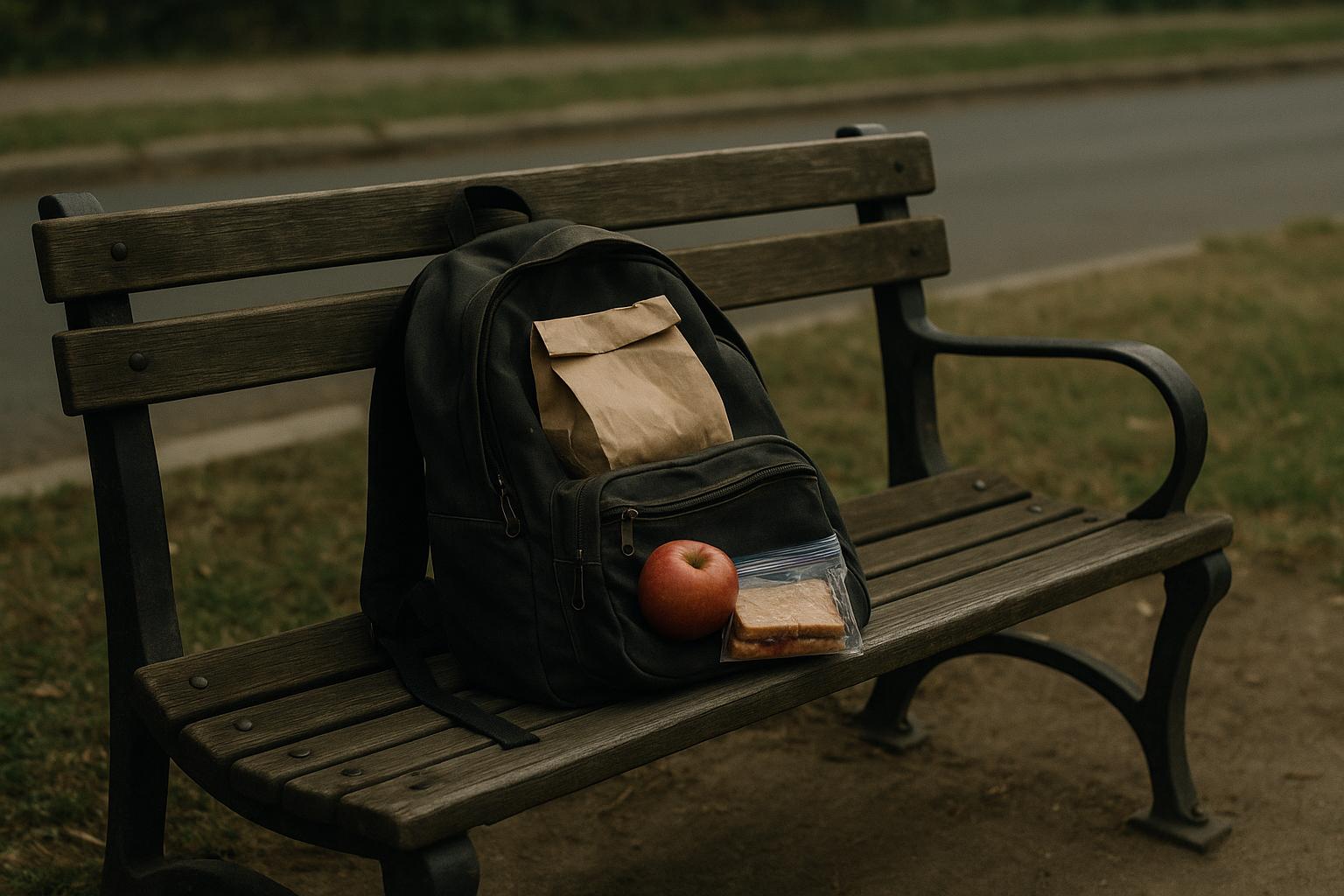Families across England face growing hardship during summer holidays, with rising demand for food support amid fears of increased child hunger as free school meals end and charitable services struggle to keep pace.
Families across England are facing acute financial hardship over the school summer holidays, with many parents struggling to provide basic meals for their children once free school meals are no longer available. A father-of-three from London shared with Sky News how he and his wife, despite both working, have been forced to sell toys, clothes, ornaments, and even dip into their children’s birthday money just to keep food on the table. “It’s not champagne and caviar we need – just fruit and veg, yoghurts, bread, milk,” he said, highlighting the stark reality behind the cost-of-living crisis.
This father’s experience is far from isolated. According to a report by The Felix Project charity, 67% of teachers in England are worried that at least one child in their class will go hungry during the summer holidays, a period when free school meals are not provided. This figure amounts to roughly 675,000 pupils at risk of food insecurity—meaning they consistently lack access to affordable and nutritious food. The teacher survey showed that more than half feared up to three children per class could be affected, while 13% were concerned about four to six pupils, with some classrooms reporting as many as 11 children facing hunger.
The scale of the challenge is particularly pronounced in urban areas like London. A survey commissioned by The Felix Project found nearly two-thirds of London teachers are concerned about ‘holiday hunger’ affecting their pupils, with estimates suggesting up to 98,000 school children in the capital alone could go without sufficient food during the summer break. At William Ford Junior School in Dagenham, a food bank run in partnership with The Felix Project expected to cater for around 50 families but quickly found demand far exceeded projections. Family support worker Kerry Noakes noted, “We know Felix estimated one child in every class would go hungry. We felt it was more accurate to say four or five children in each class.” The food bank increasingly serves parents, elderly relatives, and neighbours, demonstrating the wider community impact.
Demand on food charities continues to surge. At The Felix Project’s London centre, which distributes cooked meals, head of community engagement Rachel Ledwith described how many working families who had never before needed support are now turning to food banks. “Even with the incredible work that we’re doing, there are still children going hungry,” she said. The charity’s services are oversubscribed every summer, forcing staff to turn people away despite overwhelming need, with around 800 organisations currently on a waitlist for support.
The government acknowledges the pressures families face during school holidays. The Department for Education (DfE) said it recognises that holidays can be a “pressurised time for parents” and pointed to its “Plan for Change,” designed to provide financial relief both in term time and holidays. Recently, the government announced an extension of funding for the Holiday Activities and Food (HAF) programme, which supports councils in providing free meals and activities for children eligible for free school meals. This programme, targeting children from reception to year 11, is said to help parents save more than £300 annually. With an investment of £600 million over the next three years, the extension aims to address some of the gap, though the continuing rise in demand underscores the scale of the challenge.
The combination of a widening cost-of-living crisis and the end of free school meals during holiday periods paints a concerning picture for child food insecurity in England. Charity reports, teacher surveys, and the lived experiences of families highlight a growing need for accessible support systems to ensure children do not go hungry when they are out of school. Despite government programmes and charitable interventions, many parents and children remain vulnerable, with food banks and community services struggling to keep pace with rising demand.
 Reference Map:
Reference Map:
- Paragraph 1 – [1], [2]
- Paragraph 2 – [1], [3], [5]
- Paragraph 3 – [1], [4], [6], [7]
- Paragraph 4 – [1], [2]
- Paragraph 5 – [1]
Source: Noah Wire Services
- https://greatdriffieldradio.co.uk/uk/weve-sold-toys-clothes-and-even-used-my-kids-birthday-money-the-parents-struggling-to-feed-kids-during-school-holidays/ – Please view link – unable to able to access data
- https://news.sky.com/story/weve-sold-toys-clothes-and-even-used-my-kids-old-birthday-money-the-parents-struggling-to-feed-children-during-school-holidays-13420676 – An article from Sky News highlights the struggles of parents during school holidays, focusing on a father from London who has sold personal items and used his children’s birthday money to provide basic necessities. The piece underscores the widespread issue of holiday hunger, with data revealing that 67% of teachers in England are concerned about children going hungry during the summer break. The Felix Project, a charity in London, reports a surge in demand for their services, with many working families turning to food banks to feed their children.
- https://thefelixproject.org/news/more-than-two-thirds-of-teachers-in-england-are-concerned-children-will-experience-holiday-hunger – The Felix Project reports that over two-thirds (68%) of teachers in England are concerned that at least one child in their class will experience hunger during the summer holidays due to financial constraints. The survey, conducted by Teacher Tapp, indicates that 50% of teachers worry about one to three children going hungry, while 13% are concerned about four to six children. This equates to approximately 645,000 school children at risk of holiday hunger.
- https://www.standard.co.uk/news/london/london-teachers-survey-food-hunger-felix-project-school-b1238734.html – An article from the Evening Standard reports that nearly two-thirds of London teachers are concerned that their pupils will experience ‘holiday hunger’ during the summer break. The survey, commissioned by The Felix Project, estimates that up to 98,000 school children in London could be affected. The findings highlight the widespread issue of food insecurity among children during school holidays, particularly in urban areas.
- https://www.bigissue.com/news/social-justice/teachers-children-hungry-summer-food-free-school-meals/ – The Big Issue reports that more than two-thirds (68%) of teachers in England are worried that at least one child in their class will experience hunger during the summer holidays because their parents cannot afford to feed them. The survey, conducted by The Felix Project, suggests that approximately 645,000 children across the country are at risk of holiday hunger, highlighting the pressing issue of food insecurity among schoolchildren during the summer break.
- https://www.standard.co.uk/news/london/london-teachers-survey-food-hunger-felix-project-school-b1238734.html – An article from the Evening Standard reports that nearly two-thirds of London teachers are concerned that their pupils will experience ‘holiday hunger’ during the summer break. The survey, commissioned by The Felix Project, estimates that up to 98,000 school children in London could be affected. The findings highlight the widespread issue of food insecurity among children during school holidays, particularly in urban areas.
- https://www.standard.co.uk/news/london/london-teachers-survey-food-hunger-felix-project-school-b1238734.html – An article from the Evening Standard reports that nearly two-thirds of London teachers are concerned that their pupils will experience ‘holiday hunger’ during the summer break. The survey, commissioned by The Felix Project, estimates that up to 98,000 school children in London could be affected. The findings highlight the widespread issue of food insecurity among children during school holidays, particularly in urban areas.
Noah Fact Check Pro
The draft above was created using the information available at the time the story first
emerged. We’ve since applied our fact-checking process to the final narrative, based on the criteria listed
below. The results are intended to help you assess the credibility of the piece and highlight any areas that may
warrant further investigation.
Freshness check
Score:
7
Notes:
The narrative references a survey by The Felix Project from July 2024, indicating the content is over a year old. The report has been republished across various outlets, including The Standard and The Big Issue, suggesting widespread dissemination. The inclusion of updated data may justify a higher freshness score, but the recycled nature of the content warrants a flag. ([standard.co.uk](https://www.standard.co.uk/news/london/london-teachers-survey-food-hunger-felix-project-school-b1238734.html?utm_source=openai), [bigissue.com](https://www.bigissue.com/news/social-justice/summer-holidays-children-hungry-school-teachers/?utm_source=openai))
Quotes check
Score:
6
Notes:
The direct quotes from teachers and charity representatives are consistent with those found in the original July 2024 report. Variations in wording across different publications may indicate paraphrasing rather than original reporting. The lack of new, exclusive quotes suggests the content is not original.
Source reliability
Score:
8
Notes:
The Felix Project is a reputable charity, and the original survey was conducted by Teacher Tapp, a known research organisation. However, the republishing of the narrative across multiple outlets, including The Standard and The Big Issue, raises questions about the originality of the content.
Plausability check
Score:
9
Notes:
The concerns about holiday hunger among children in England are well-documented and align with previous reports. The figures presented are consistent with those from the original survey. The narrative’s tone and language are appropriate for the topic and region, with no inconsistencies noted.
Overall assessment
Verdict (FAIL, OPEN, PASS): FAIL
Confidence (LOW, MEDIUM, HIGH): HIGH
Summary:
The narrative is based on a survey from July 2024, with content that has been widely republished, indicating a lack of freshness and originality. The reliance on recycled material and the absence of new, exclusive information suggest potential disinformation.













